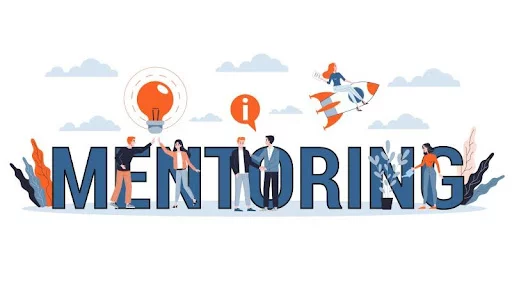
Mentoring: it pays to learn from the experienced!
Mentoring is a fantastic way to develop professionally and personally, and there is a growing number of mentoring programmes and a growing tradition of mentoring within companies. In this article, we look at how:
- What exactly is mentoring
- What makes it different from, say, a coaching process.
- The most common mentoring models will be discussed
- Here are some ideas on how to find a mentor.
- And, of course, there will also be a discussion on what perspectives to consider in project management.

What is mentoring?
Mentoring is a mutually cooperative relationship, the primary goal of which is to develop the mentored person, facilitate and accelerate his or her learning process, and pave the way for his or her career.
The most common form is when an experienced person in a senior position mentors a less experienced employee. Mentoring therefore often takes place within the organisation. Organisational goals are also brought to the fore. The areas most often developed through mentoring are:
- Defining a career path
- Business skills
- Professional development techniques, rules
- Work-life balance
Formal and informal mentoring
Mentoring can take place in formal and informal settings:
- If formal, they set targets to be achieved, with specific requirements to be met and measurable
- If it is informal, measurable targets are not necessarily set and the process itself is less structured
The mentoring process
Initiation phase
This is the stage where the mentored person and the mentor interact. The mentee often needs to demonstrate that he or she is worthy of the mentor's attention, as both parties are looking for an enjoyable and positive relationship that is worth the time spent
Learning stage
The mentored person learns from the mentor during the phase. The mentor coaches the mentee on how to work effectively and efficiently. It gives the mentor challenging tasks, and if they work within an organisation, it maximises the mentor's visibility in the organisation, actively promoting and recognising them. It is also at this stage that an interpersonal relationship based on trust is developed, the mentor accepts and reinforces the professional identity of the mentee, and their relationship matures into a friendship.
Splitting stage
This means the end of the mentoring relationship, which can come for a number of reasons:
- The mentored person wants to develop a new identity
- Nothing left to learn
- Or the mentor feels it is time for the mentee to "fly out"
The problem can arise when one party does not want to break the relationship: the mentored may feel abandoned, unprepared and thus betrayed, and the mentor may feel used.
Redefinition stage
Mentor and mentored recognise that the relationship may continue, but in a different way than before: a friendship or good collegial relationship may develop.

What makes a good mentor?
The mentor is usually a kind of role model, a sounding board for the mentee. His or her responsibilities are therefore considerable and it is essential that he or she meets the following requirements:
- High level of professional experience in your own field (and in the field you want to develop during the mentoring process)
- An inner drive to take responsibility and teach the next generation
- Open to social and technological innovation
- Committed, empathetic and interested in sharing knowledge
- Selfless, honest and constructive
- Inspiring, positive outlook
- You know your limits
However, the mentor is not the messenger, it is up to the mentee to find their own resources, use the knowledge they have gained and find solutions. It is also essential that the mentor-mentee relationship is based on mutual sympathy, trust and honesty.
The benefits of mentoring for participants
Although at first glance it may seem that mentoring is mainly for the benefit of the mentee, in reality the mentor also gains a lot of new experiences and learns more about the process.
See how mentored and mentor benefit from working together!
Why does mentoring benefit the mentee?
- Become more efficient at work
- Learn new skills
- Gain more confidence
- Make better career decisions
- A new perspective that pushes your own boundaries and helps you to overcome them
- Overall, you can achieve your goals faster and more efficiently
How does the mentor benefit from the process?
- You will be closer to your mentored generation, you will understand it better
- Discover new cultural perspectives
- Develop your technical, interpersonal and leadership skills
- Discover new ideas, new ways of seeing
- Personal sense of achievement and satisfaction from helping others

Mentoring vs. coaching: what is the difference?
Many people are not clear about the difference between the coaching process and mentoring. Although at first glance similar, in reality the two processes are very different. In coaching, the coach does not need to be an expert in his or her client's field, only in how to get the most out of them. Solutions are almost entirely invented by the client. Mentoring, on the other hand, requires the mentor to be an expert in the area of interest to the mentee, to share his or her own experience and thus help the mentee to develop and grow.
What other important differences are there between the two processes?
- A mentor is both an adviser and a guide, while a coach does not give specific advice but helps the client along the way by asking targeted questions
- Mentoring usually lasts longer than 6 months, whereas the coaching process is rarely longer than 6 months
- While coaching is based on a set process, mentoring is less structured - but it is still worth setting an agenda.
The most common mentoring models
One-on-one or traditional model
This is the set-up that most people first think of when mentoring. So you have a usually older, more experienced manager or entrepreneur helping a less experienced up-and-coming employee, or perhaps another entrepreneur.
Group mentoring
It involves one (or more) mentors working with a whole team. It is usually used where there are no resources or time for the traditional model: in schools or youth clubs, it is a common form of mentoring.
Peer mentoring
In this case, people with similar experience in broadly the same role, field or department are paired up to support each other in developing their work or business. They share experience and support each other.
Reverse mentoring
In this case, both parties benefit equally from the mentoring process. The younger, lower-ranking, talented employee helps the more experienced one to introduce and understand a new technology, for example, and in return he or she learns about the managerial thinking and the reasons behind the decisions. Another benefit is that the manager also gets a better insight into the viewpoints of the junior staff and gains access to information.
Speed mentoring
This form of mentoring, which is most reminiscent of a lightning date, usually takes place at a company event or conference. In this case, the mentored person has a short dialogue with different mentors and then moves on. Mentored people are usually prepared in advance with questions to discuss with more experienced people.
How to find a mentor?
The above may already show the huge impact on personal and business development that can result from finding a mentor who can truly be a role model. But finding a mentor is not so easy. How to get started?
- Let's see if mentoring programmes are available in our area! Although most mentoring programmes are linked to the alumni network of higher education institutions, more and more professional and entrepreneurial organisations are now offering this type of service.
- Ask your HR manager or HR manager at work! It's a good idea to prepare for the meeting in advance and outline exactly what you want to achieve and what qualities you want in a mentor.
- List 10 people who could be your mentor in something. It's worth thinking about what you like about what they do or how they do it, and what exactly you want to learn from them.
- Let's discuss the issue with a colleague or friend! Think about whether there is someone in your circle of friends who could be a mentor. It is always worth thinking about someone you already know.
Is our supervisor a good choice?
If your goal is career development, your boss may not be a good choice. Because long-term career goals may be the same, he may not pass on the right knowledge or give advice that suits his goals
Can someone have more mentors?
Of course! We can have a mentor for public speaking or writing and of course business development, leadership development.
Mentoring in project management
The use of mentoring in programme and project management is considered a best practice. This is based on the growing number of project-based organisations where there are more opportunities than ever to become a programme and project manager. According to PMI, developing mentoring relationships is a management criterion, as mentoring provides a valuable contribution to the performance of team members. The same applies to project management, where the mentor:
- Provides guidance on how your mentor can make better progress in their career, offering specific courses and training
- Suggest professional associations, help with books, articles to read, webinars, seminars and conferences to attend
- Helps you to understand the informal networks and influences within the organisation and how the mentored person can use them to their advantage
- Provide advice and feedback on the work to be done/performed and on risk and problem management
In the field of project management, there are a number of setups that can help a team member to perform better and thus achieve better project results.
- Project manager and team member: Developing different preferred behaviours, problem solving, feedback on methods used, keeping a problem log which will become part of the knowledge base, developing consistency and clear communication
- PMO and project manager or team member: a PMO can access logs of experience from previous projects, which in themselves can provide guidance on how to deal with specific problems
- Functional manager and team member: for complex projects, the functional manager can advise on any technical problems that may arise
- External expert and team member: for example, an external risk management expert can better identify the potential risks of the project, help you analyse them, create a risk management plan and determine when to put this plan into action
- External external manager and project manager: the mentored person can express his/her opinion about what is happening in his/her organisation, and the mentor can share his/her experience of what is happening in his/her organisation, and present a different perspective to the project manager
Summary
Mentoring is therefore always between an experienced person with a high level of expertise and a less experienced colleague or other entrepreneur. The most important element is that the mentor is able to give advice and is willing to share his or her knowledge and experience with the mentee. There are now many forms of mentoring, and fortunately it is becoming more and more common in our country.
Mentoring can also be found in the field of project management, mentoring is one of the management competences that has a positive impact on the performance of staff and therefore on project results.
Have a question? Contact us!
Are you unsure about what form of support could solve your problems? Read more about our coaching services here, or contact us!

 Designabc
Designabc